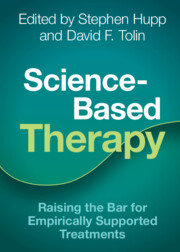Book contents
- Science-Based Therapy
- Series page
- Science-Based Therapy
- Copyright page
- Dedication
- Contents
- Tables
- Contributors
- Preface
- Acknowledgments
- 1 What Is Science-Based Therapy?
- 2 Depressive Disorders
- 3 Bipolar Disorder
- 4 Anxiety Disorders
- 5 Obsessive-Compulsive Disorder
- 6 Posttraumatic Stress Disorder
- 7 Dissociative Disorders
- 8 Pain
- 9 Eating Disorders
- 10 Insomnia Disorder
- 11 Sexual Dysfunctions
- 12 Substance Use Disorders
- 13 Cognitive Loss
- 14 Antisocial Behavior
- 15 Borderline Personality and Other Personality Disorders
- 16 Psychosis and Schizophrenia
- 17 Autism Spectrum and Intellectual Developmental Disorder
- 18 Attention-Deficit/Hyperactivity Disorder
- 19 Tic Disorders
- 20 Couples Discord
- 21 Psychotherapy Relationships
- Postscript
- Index
- References
3 - Bipolar Disorder
Published online by Cambridge University Press: 10 January 2025
- Science-Based Therapy
- Series page
- Science-Based Therapy
- Copyright page
- Dedication
- Contents
- Tables
- Contributors
- Preface
- Acknowledgments
- 1 What Is Science-Based Therapy?
- 2 Depressive Disorders
- 3 Bipolar Disorder
- 4 Anxiety Disorders
- 5 Obsessive-Compulsive Disorder
- 6 Posttraumatic Stress Disorder
- 7 Dissociative Disorders
- 8 Pain
- 9 Eating Disorders
- 10 Insomnia Disorder
- 11 Sexual Dysfunctions
- 12 Substance Use Disorders
- 13 Cognitive Loss
- 14 Antisocial Behavior
- 15 Borderline Personality and Other Personality Disorders
- 16 Psychosis and Schizophrenia
- 17 Autism Spectrum and Intellectual Developmental Disorder
- 18 Attention-Deficit/Hyperactivity Disorder
- 19 Tic Disorders
- 20 Couples Discord
- 21 Psychotherapy Relationships
- Postscript
- Index
- References
Summary
The most efficacious treatments for bipolar disorder include cognitive-behavioral therapy, family-focused therapy, and systemic care. Credible components of treatment include psychoeducation, cognitive restructuring, social support, and relapse prevention. The chapter also include a sidebar on research therapists and another on overcoming challenges to learning and implementing therapy.
Keywords
- Type
- Chapter
- Information
- Science-Based TherapyRaising the Bar for Empirically Supported Treatments, pp. 30 - 46Publisher: Cambridge University PressPrint publication year: 2025
References
Useful Resources
National Institute of Mental Health (NIMH), Bipolar Disorder, www.nimh.nih.gov/health/topics/bipolar-disorder.
National Alliance on Mental Illness (NAMI), https://nami.org/About-Mental-Illness/Mental-Health-Conditions/Bipolar-Disorder.
Depression and Bipolar Support Alliance (DBSA), www.dbsalliance.org/education/bipolar-disorder/.
Substance Abuse, and Mental Health Services Administration (SAMHSA), www.samhsa.gov/serious-mental-illness/bi-polar.
American Psychiatric Association. Bipolar Disorders, www.psychiatry.org/patients-families/bipolar-disorders.
American Psychological Association. Bipolar Disorder, www.apa.org/topics/bipolar-disorder.
US Department of Veteran Affairs. Bipolar Disorder. www.mentalhealth.va.gov/bipolar/index.asp.
Basco, M. R. (2015). The Bipolar Workbook: Tools for Controlling your Mood Swings, 2nd ed. Guilford Press.

